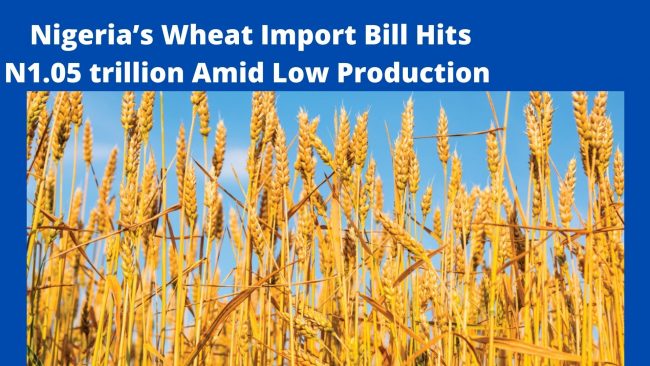Nigeria’s wheat import bill stands at N1.05 trillion in one year despite efforts by the Federal Government to boost local wheat production.
Data obtained by BizWatch Nigeria from the National Bureau of Statistics (NBS) showed that durum wheat flour is one of the major agricultural products imported in the past year.
The report indicated that durum wheat valued at N1.05 trillion was imported from the United States, Latvia, Canada and Russia, among others from Q3 2020 to Q2 2021.
Data obtained from the National Bureau of Statistics showed that durum wheat flour and seeds were one of the major agricultural products imported in the first quarter of the year.
The data showed that durum wheat valued at N127.85bn was imported from the United States, Latvia, Canada, Argentina, Russia and Lithuania.
This is an indication that the value of wheat imports grew by 22 percent between January and March 2020 compared with Q1 2019 imports from Argentina, Canada, Russia, United Arab Emirates and the United States valued at N105.113billion.
A forecast made by the Food and Agricultural Organisation (FAO) indicated that Wheat imports by Nigeria this year could reach 5.5 million tonnes as against 4.8 million tonnes in 2020.
Despite the Government’s efforts to boost domestic production and curb imports, wheat imports by Nigeria remain high due to its limited land suitability for wheat cultivation, coupled with a fast-growing population and strong demand for wheat flour-based products, FAO said.
A breakdown of the data showed that the import bill for wheat in Q3 2020 was N211.24 billion and it increased to N256.49 billion in N256.49 billion. In Q1 2021, Durum wheat valued at N N258.3 billion was imported which increased to N324.72bn in Q2.
READ ALSO: Availability Of Forex Will Stimulate Economic Growth – MAN
Last year, the COVID-19 pandemic affected wheat production with many farmers unable to harvest their products on time leading to losses, Wheat Growers Association of Nigeria.
The President of the association, Salim Muhammad, said, “The virus started spreading during our harvest period and it could not allow farmers to have access to their farms due to restriction in movement and lockdown. It did not allow the farmers to get the labour they need because of the social gathering restriction put in place,” he said.
He explained that birds, insects and the weather had destroyed some of the ripe wheat that couldn’t be harvested on time.
“The farmers who were able to harvest successfully did not have access to the market because of the lockdown,” Muhammad said.
He said the association had made projections for 34 million tonnes of wheat-based on 11,185 farmers approved by the CBN but unfortunately due to the restricted movement, the group could not ascertain the volume of harvested wheat.
FAO estimated that 21 million tonnes were harvested in Nigeria last year.
Meanwhile, FAO has estimated that current prospects showed that the 2021 harvest in Africa will grow by 1.0 percent year-on-year to 25.6 million tonnes due to yield recoveries in Nigeria as well as Côte d’Ivoire, Ghana and Senegal.
Forex Restriction For Wheat Import
The Central Bank of Nigeria (CBN) in April this year disclosed it plans to halt forex supply for importers of sugar and wheat, as part of the strategy to conserve dollar reserves.
Africa’s most populous country, and its biggest economy,
Nigeria, which is Africa’s most populous country, relies on imports to feed its 200 million people and the consumption of derivatives of wheat such as bread and spaghetti has increased considerably.
The central bank restricted access in 2015 to foreign exchange for 41 items it says can be produced locally, and has been added to the list since then.
“Sugar and wheat to go into our FX restriction list. We must work together to produce these items in Nigeria rather than import them,” the central bank said in a tweet.
READ ALSO: Warri-Itape Rail Project 100% Complete – FG
Some of the banned items are rice, cement, margarine, palm produce, beef, vegetables, poultry and eggs, wooden doors and iron rods, including maize which was banned in 2020.
Though the plan is to conserve the country’s external reserves and encourage local production amid forex supply dearth, analysts warn that this will push up food prices and worsen inflation.
The Nigerian currency has stabilised to N437.62 to one dollar as of September 30, 2021 after the central bank sold restricted forex sales to Bureaux De Change and introduced different policies to stabilise the fore market.
Govt, Millers Boost Wheat Production With Improved Seeds
The Central Bank of Nigeria (CBN) says it has developed strategic action plans to boost wheat production by addressing the existing challenges in its value chain.
The Director, Development Finance Department at the CBN, Mr. Philip Yila Yusuf, said this in Abuja at a wheat conference and stakeholder engagement.
According to him, “the CBN plans to address key problems in the value chain through financing massive production of wheat in Nigeria and seeks to facilitate sustained availability of high yield seed variety in-country and improve general productivity.”
He disclosed that wheat was the second-highest contributor to the country’s food import bill putting pressure on the country’s foreign reserve.
To improve the boost wheat production, the Flour Milling Association of Nigeria is also working with the Lake Chad Research Institute (LCRI) in Maiduguri and the Institute for Agricultural Research (IAR) at the Ahmadu Bello University, to train local smallholder farmers on the latest agronomic practices.
In terms of seed varieties, it has been adjudged that the use of certified seeds of improved varieties and the adoption of modern farming techniques by farmers are effective production improvement levers that can be utilized to enrich the domestic food landscape.










